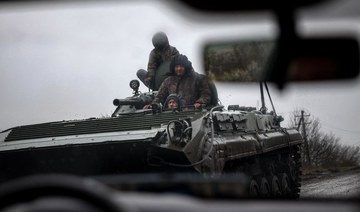LONDON/FRANKFURT: Ukrainian forces are finding a growing number of components from China in Russian weapons used in Ukraine, a senior adviser in President Volodymyr Zelensky’s office told Reuters, as Western supplies are squeezed by sanctions.
In “the weapons recovered from the battlefield we continue to find different electronics,” said Vladyslav Vlasiuk, who advises the president’s chief of staff on sanctions policy.
“The trend is now that there is less Western-made components but more – not hard (to) guess which country – made components. Of course, China,” he said via a video call.
China has repeatedly denied sending military equipment to Russia since Moscow’s all-out invasion of Ukraine in February 2022. The assault triggered Western sanctions, including on sending military and dual-use technology such as microchips that could be used in either ordinary appliances or weapons.
Intelligence gathered by Ukrainian experts from the battlefield and shared with Reuters stated that Chinese-made components were found in a navigation system in Orlan aerial drones that had previously used a Swiss system.
The experts also reported finding Chinese parts in the fire control system in Russian tanks that had earlier used French-made parts.
Reuters could not independently verify the intelligence, including whether the components mentioned may have been intended for non-military use or whether they were moved to Russia by a third party.
“We’re picking (up) a lot of different stuff, China made,” Vlasiuk said.
Asked whether Chinese companies had provided parts for Russian military hardware, China’s foreign ministry spokesperson’s office told Reuters: “Throughout history, China has launched normal trade cooperation with all countries, including Russia, on the basis of equality and mutual benefit.”
“As for military item exports, China has throughout adopted a prudent and responsible attitude. China’s position and actions have always been this way.”
NAMING NAMES
Vlasiuk said that Ukraine was able to identify some manufacturers or suppliers and share that information with Western allies.
He named China North Industries Group (Norinco), a Chinese weapons maker, as one supplier and military supplier Xinxing Guangzhou Import & Export Co. as another, without saying what they had supplied.
A member of staff at Norinco, who declined to give their name, said the company was “not providing military equipment components to Russia.”
Xinxing Guangzhou Import & Export Co. did not immediately respond to a request for comment.
Russia’s foreign ministry did not immediately respond to a request for comment.
The top US diplomat Antony Blinken last month said China had not “crossed that line” yet of supplying Russia with lethal aid.
However, US officials are watching developments closely and are concerned, in particular, by so-called dual-use products, such as electronics that can be used in, say, a microwave or a missile.
“We and our partner governments are relentlessly focused on restricting Russia’s access to key technologies that fuel its brutality in Ukraine,” said a senior State Department official. “We will continue to take action to degrade Putin’s war machine.”
Earlier this week, the US added Chinese companies to its latest sanctions, including a satellite image reseller that the State Department said supplied imagery of locations in Ukraine to entities affiliated with Wagner and its head, Yevgeny Prigozhin.
China, which has positioned itself as a mediator, has said it is not interested in inflaming the conflict as it says Western arms supplies to Ukraine do.
Ukraine has imposed sanctions on the Chinese company Comnav Technology for supplying navigation and radar equipment to Russia that could be used to support Russian and Iranian drones and missiles. A Comnav staff member, asked whether it was supplying components to Russia said, “No, of course not.” The staff member declined to be named.
Vlasiuk described an “ongoing battle” first to impose sanctions on Russia and then to close loop-holes Moscow would find to avoid them.
“We see that there a lot of examples of third countries continuing, willingly or not, to support sanctions circumvention,” he said.
















